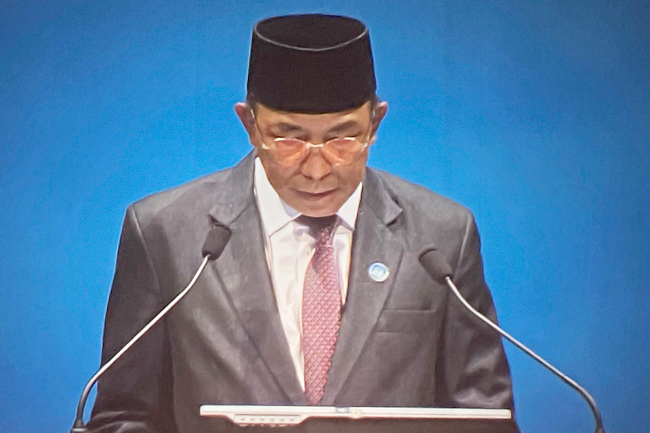James Kon
Brunei continues to stand for multilateralism, unity and regional cooperation, especially in tackling water challenges. Thus the Sultanate is committed to working with the community, regional members and global participants to manage water sustainably.
The Sultanate’s commitment in addressing water challenges was shared by Minister of Development Dato Seri Setia Ir Awang Haji Suhaimi bin Haji Gafar in his address at the 4th Asia-Pacific Water Summit (4thAPWS) in Kumamoto, Japan yesterday.
Dato Seri Setia Ir Awang Haji Suhaimi also iterated Brunei Darussalam’s full support and commitment in principal for the non-legally binding Kumamoto Declaration to be adopted as a way forward in achieving mutual goals.
The minister said, “We are confident that the declaration can bring us to a heightened and new level of cooperation and coordination in addressing water-related issues.”
In dealing with water security as well as facing the challenges of water scarcity and climatic change, he said, “Brunei Darussalam is of no exception to such predicament”.

The minister added, “In turn, we would like to share the experiences and current status on the development of water resources and supply in Brunei Darussalam, the challenges and water issues that we face towards achieving sustainability in every aspect.
“We are fortunate that we are able to provide 100 per cent of the population with quality potable water within the World Health Organization International Water Quality Guidelines. These include those living in rural areas, where access by road is unavailable, and supply of water is provided through the installation of individual community water purification system by utilising slow sand filtration systems. The system is well managed by the villages with quarterly monitoring and continuous support from the Department of Water Services, Public Works Department.”
The overall water supply and demand sustainability in Brunei, he said, “is largely achieved due to various factors which includes and not limited to the manageable size of the country’s population; the considerably small geographical land area; adequate available water resources; and relatively strong economic conditions to provide financial support for the sustainability of services”.
However, he also acknowledged that the greatest challenge the country faces is the increasing demand due to population growth and industrial development, coupled with the ongoing issue of global warming and the COVID-19 pandemic.
To ensure a clear vision to address these challenges, he revealed that the ministry formed the Water Security Framework 2021-2035 to address four key strategies to increase robustness of the overall water supply system of the country covering all aspects of water supply management: water resources and production; water network efficiency; water quality; and water governance.
Such efforts, he said, “are reflected in our government’s efforts in the application of reservoir conservation and development, water conservation policies and programmes, water governance and demand management, as well as enforcements to tackle issues related to water pollution and uncontrolled development that pose serious negative impact to water resources”.
He added that Brunei Darussalam is on its way to exploring current technological advancements in addressing and tackling water issues, which include improvements to geographical information system (GIS) mapping, new metre management programme, upgrading telemetry system, planned maintenance programme, and improvement to the water infrastructure maintenance system.
The minister said, “We acknowledge that financing needs of water infrastructure development are huge, where most infrastructure projects tend to be capital intensive.
This is one of the many challenges that countries are facing in search of appropriate financing approaches and incentives to suit their conditions.
“There is no ‘one solution’ to the many challenges that we are facing. At the same time, strategic assistance is still required to better the approach and implementation of an integrated water resource management due to the relatively small pool of technical expertise available locally.”
Currently, he said, all infrastructure projects in the Sultanate are financed by the national revenue generation.
“With the popular adoption of a public private partnership financial system on infrastructure development worldwide, we will ourselves consider adopting the system too. But consideration will be taken with the low income population in mind, so that full accessibility to basic needs can be enjoyed by all,” said the minister.






